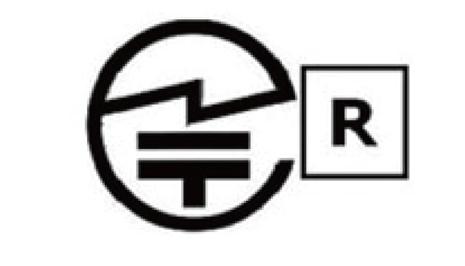Certification Introduction:
The certification of radio frequency equipment in Japan is called Radio Equipment Type Approval. The official control agency is the Ministry of Internal Affairs and Communications (MIC (Ministry of Internal Affairs and Communications) of Japan). The main certification agency is TELEC (Telecom Engineering Center) designated by MIC. TELEC certification, also known as MIC certification, RF certification, GITEKI certification, technology certification, is similar to the domestic SRRC certification.
TELEC certification follows Japan's "Radio Law" (Radio Law), and the specific test specification is to follow the MIC (Ministry of Internal Affairs and Communications) Notice No.88 regulations. According to the requirements of Japan's "Radio Wave Law", the production, sale and operation of wireless equipment in Japan must comply with the technical regulations approved by MIC, and it is mandatory to apply for a type approval certificate (ie TELEC certification) for radio equipment.

Basic Information of TELEC Certification:
• Is it mandatory: mandatory certification
• Factory audit requirements: no requirements, but ISO certificates or approved quality control documents are required
• Licensee Requirements: No Requirements
• Certificate validity: none
• Technical Information: Voltage Frequency AC 100V/200V, 50Hz/60Hz, Plug JIS 8303
Description of TELEC certification, GITEKI certification, MIC certification and MARK certification:
TELEC certification and GITEKI certification
The full name of Japan's TELEC is TELECom Engineering Center. It is the certification body of the "Radio Wave Law" recognized by the Ministry of Internal Affairs and Communications of Japan. In 2014, the TELEC agency also obtained the certification qualification of the "Electrical Communication Business Law". Now it is popular to say that TELEC certification is equivalent to GITEKI certification. .
TELEC certification and MIC certification
The Japanese Ministry of Internal Affairs and Communications is referred to as MIC, and the English full name is Ministry of Internal Affairs and Communications. The Ministry of Internal Affairs and Communications is the regulatory agency of Japan's "Radio Wave Law" and "Electrical Communications Business Law". Generally speaking, MIC certification is equivalent to TELEC certification.
TELEC certification and MARK technology certification
After passing the TELEC certification, the product can be printed with the GITEKI logo. GITEKI comes from the Japanese name for certification: "Technology マーク", the Japanese word technology is spelled GITEKI in Roman characters, so GITEKI certification is also called technology certification, GITEKI certification and Skilled certification is just a different name.
Certification Classification:
TELEC certification includes Test Certification and Type Certification:
• The test certification is verified for each equipment unit, and the certification is only valid for each verified equipment unit;
• Type approval refers to the verification of a sample of a batch of equipment of the same design and manufacture. The approval is valid for the batch of equipment, but if the design or manufacture of the equipment has changed, the equipment will need to be re-certified.
It is worth noting that the use of non-low power radio stations and their terminal equipment requires a license from the MIC. In addition, there are two cases for compliance certification of telecommunications terminal equipment:
• For ordinary telephone devices, JATE certification is required as long as required by the Telecommunications Business Law;
• For wireless terminal equipment, in addition to JATE certification as required by the Telecommunications Business Law, TELEC certification as required by the Radio Law is also required.
Applicable Product Range:
TELEC certification is aimed at wireless radio frequency products including: Bluetooth products, ZigBee products, telemeters, WiFi products, wireless microphones, pagers, LTE·RFID (2.4GHz, 920MHz) products, UWB radio systems, GSM products, etc.
Other:
Bluetooth and WiFi Product Testing Requirements
The test certification is verified for each equipment unit, and the certification is only valid for each verified equipment unit. The test items of WiFi and Bluetooth products are basically similar to the European standard EN300 328. The standard used by 2.4GHz WiFi products (802.11b/g, 2412~2472MHz) and Bluetooth products is MIC Notice No.88 Annex43, but 14 channels (Channel 14: 2471 ~ 2497MHz) of 2.4GHz WiFi products need to be used separately Annex44 conducts tests and issues reports, and the corresponding fees also need to be increased. For 5GHz WiFi products (802.11a, 5180~5320MHz, W52 Band and W53 Band), the test standard to follow is Annex45, but it should be noted that the data shows that MIC will modify Annex45 in the near future. It is classified into Annex45 and has stricter DFS test requirements for Band 56 frequency band.
Bluetooth product test content
1. Frequency Error Measurement
2. Occupied Bandwidth and Spread-spectrum Bandwidth / Factor
3. Unwanted Emission Intensity Measurement
4. Antenna Power Error Measurement
5. Receiver spurious disturbance test (Limitation of Collateral Emission of Receiver Measurement)
6. Transmission Antenna Gain (EIRP Antenna Power) Measurement
7. Transmission Radiation Angle Width (3dB Beamwidth) Measurement
8. Duty Cycle Measurement
9. Retention Time

 CN/中国
CN/中国  US/USA
US/USA  KR/Korea
KR/Korea  DE/Germany
DE/Germany  ES/Spain
ES/Spain VN/Việtnam
VN/Việtnam